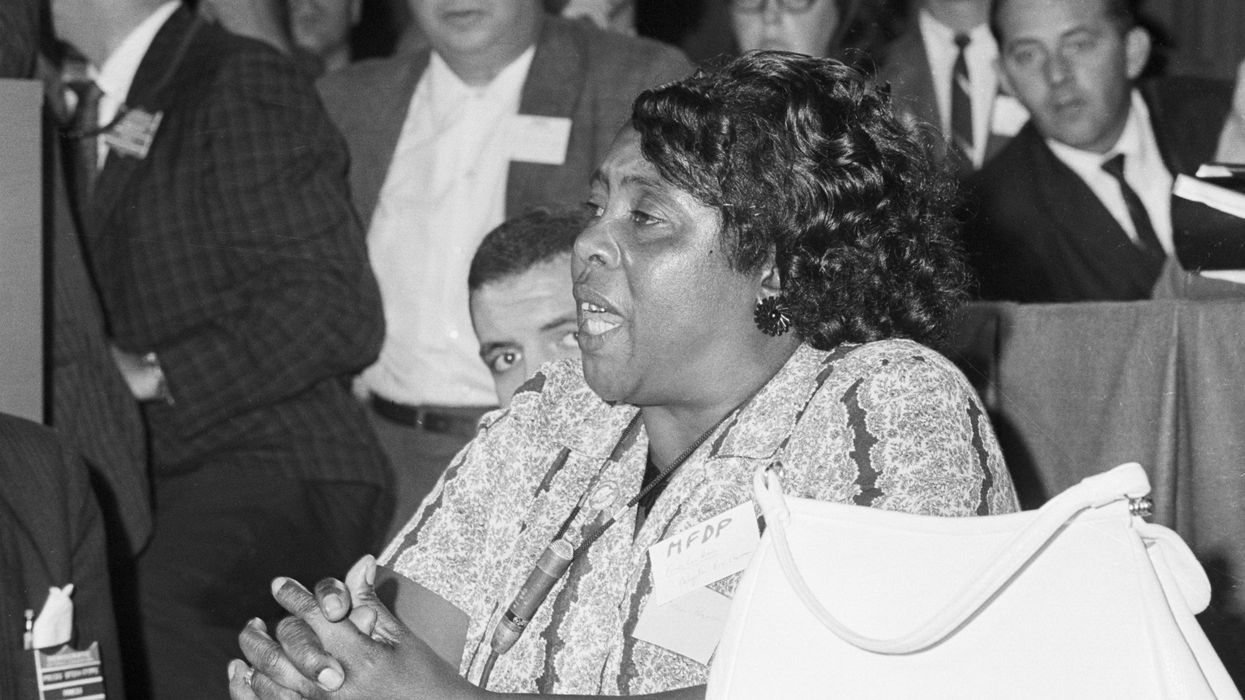Johnson is a United Methodist pastor, the author of "Holding Up Your Corner: Talking About Race in Your Community" and program director for the Bridge Alliance, which houses The Fulcrum.
Sixty years have passed since Freedom Summer, that pivotal season of 1964 when hundreds of young activists descended upon an unforgiving landscape, driven by a fierce determination to shatter the chains of racial oppression. As our nation teeters on the precipice of another transformative moment, the echoes of that fateful summer reverberate across the years, reminding us that freedom remains an unfinished work.
At the heart of this struggle stood Fannie Lou Hamer, a sharecropper's daughter whose voice thundered like a prophet's in the wilderness, signaling injustice. Her story is one of unyielding defiance, of a spirit that the brutal lash of bigotry could not break. When Hamer testified before the Democratic National Convention in 1964, her words, laced with the pain of beatings and the fire of righteous indignation, laid bare the festering wound of racial terror that had long plagued our nation. Her resilience in the face of such adversity is a testament to the power of the human spirit.
"I question America," she declared, her voice trembling yet resolute. "Is this the land of the free and the home of the brave?" In that moment, Fannie Lou Hamer embodied the essence of prophetic witness. She stood as a living testament to the moral bankruptcy of a system that had devalued Black lives for centuries. Her unwavering commitment to justice, rooted in an unshakeable faith, illuminated the stark chasm between America's professed ideals and its sullied reality.
Yet even as we acknowledge Hamer's legacy, we must also recognize our progress. The Freedom Summer of 1964 did not usher in a racial utopia, but it did shine a light on the deep-seated intransigence of white supremacy. The disenfranchisement that fueled the movement then continues to plague us, but we've also seen significant strides toward equality. As we face voter suppression tactics, both overt and insidious, we can take heart in the fact that we've overcome similar challenges in the past. This progress should give us hope for the future.
As the 2024 presidential campaign progresses this summer, the specter of Freedom Summer looms large. The American populace stands at a crossroads like our forebears 60 years ago. Will we heed the clarion call of prophetic witness exemplified by Hamer, embracing a vision of accurate equity and participatory democracy? Or shall we succumb to the forces of reaction, allowing the hard-won gains of the past to wither on the vine of complacency?
Much like it was in 1964, the answer lies not with our elected leaders but with each of us. In that pivotal year, the struggle for civil rights reached a boiling point, and the collective action of ordinary people brought about transformative change. We, the descendants of those freedom fighters, must reclaim the mantle of prophetic witness. Our ancestors marched, protested and sacrificed to pursue equality and justice. Now, it's our turn to carry the torch forward.
We must organize, mobilize and demand a society where every voice is heard and every vote is counted. This requires more than just passive agreement — it demands active engagement. We must educate ourselves, raise awareness, and use our unique skills and platforms to push for progress. It's not enough to remember the past; we must actively participate in shaping the future. By learning from history and applying those lessons to our current struggles, we can create a more equitable world for all. Our active engagement is crucial in this journey.
The Freedom Summer movement was never intended to be confined to a single season; instead, it was a powerful expression of the ongoing struggle for racial equality and justice in America. Its actual anniversary is not marked by a specific date on the calendar but by the relentless pursuit of freedom and fairness that continues to this day.
As we reflect on the sacrifices and triumphs of that pivotal summer, we draw strength from the wellspring of Fannie Lou Hamer's unyielding spirit, her voice echoing through the ages, refusing to be silenced. We are reminded that freedom is not a destination, but a journey — an arduous path that demands our constant vigilance and unwavering commitment. The struggle for true equality is far from over, and it is our duty to carry the torch lit by those brave souls who came before us. This struggle is ongoing, and it is our collective responsibility to ensure that the fight for racial equality and justice in America continues.
In this summer of 2024, as the ghosts of our past converge with the possibilities of our future, I hope we all commit effort towards engagement in the unfinished business of Freedom Summer. The road ahead takes work. We will face resistance, setbacks, and moments of doubt. However, only by acknowledging these challenges and committing to overcome them can we expect to build a nation where every citizen, irrespective of skin color, can genuinely call themselves free. The struggle continues. The witness endures. Freedom's unfinished business awaits our answer.




















